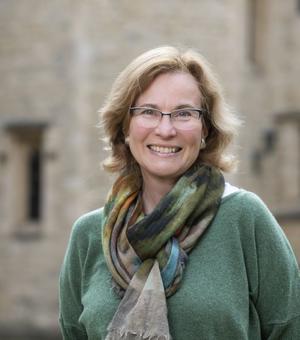Professor Helena Hamerow
Research Interests
The archaeology of northwest Europe from AD 400-1000; Early medieval rural settlements and economy; The archaeology of Anglo-Saxon England; Links between England and mainland Europe c 400-700.
Research activities
My research focuses on the archaeology of early medieval northwest Europe, c 400-1000. Recent projects have examined the impact of lordship, monasteries and population growth on farms and farming. I am also interested in ‘Great Hall’ complexes in England and what burials reveal about the position of women during the Conversion period. I am currently working with the Ashmolean Museum as External Curator of a special exhibition on early Anglo-Saxon England in its European context.
I am PI of an ERC-funded project called ‘Feeding Anglo-Saxon England. The Bioarchaeology of an Agricultural Revolution’ (‘FeedSax’; http://feedsax.arch.ox.ac.uk ). Using preserved cereal grains, faunal remains, pollen and other data, the FeedSax team is tracing the emergence and spread of key innovations that enabled medieval farmers to feed a rapidly growing population: systematic crop rotation, widespread adoption of the mouldboard plough, and ‘extensive’, low-input cultivation.
I am also one of four PIS of 'Molecular Ecology of Medieval European Landscapes' (MEMELAND), funded by an ERC Synergy Grant (https://www.arch.ox.ac.uk/article/prof-helena-hamerow-one-four-oxford-academics-receive-erc-synergy-grants-address-complex). This project will examine the impact of medieval farming regimes on the biodiversity of northern European landscapes using sedimentary DNA and archaeobotanical remains.
Research Awards
Fellow of the British Academy (2023)
Links
Feeding Anglo-Saxon England: The Bioarchaeology of an Agricultural Revolution
Modelling Urban Renewal and growth in Britain and Norh-West Europe, AD800-1300
Undergraduate teaching
Undergraduate course convenor for:
- FHS option paper - Anglo Saxon Society & Economy in the Early Christian Period
- FHS option paper - Emergence of Medieval Europe
Postgraduate teaching
Postgraduate taught course options in:
I am happy to supervise on a broad range of topics related to the archaeology of early medieval Europe, including its rural economy, mortuary practices, and material culture, in particular for the period c. 400-900.
Current students
| Early Anglo-Saxon barrow burials in England: spatial analysis and contextualisation of the Sixth and Seventh Century nationwide funerary landscape. Wyatt Wilcox | DPhil Archaeology | Supervisors: John Pouncett and Helena Hamerow |
| Geospatial Analysis of Scandinavian Settlement in Viking Northumbria Anthony Del Rio | DPhil Archaeology | Supervisors: Helena Hamerow and Jane Kershaw |
Past students
| Diet and Health in a time of transition: Pictish and Viking age Orkney Alexandra Johnson (2021) ORA | DPhil Archaeological Science | Supervisors: Rick Schulting and Helena Hamerow |
| Remnants of a Roman Past: the reuse of Roman objects in early Anglo-Saxon graves, c. AD 5th-7th centuries Jessica Dunham (2020) ORA | DPhil Archaeology | Supervisor: Helena Hamerow |
| Cosmology, Fashion and Good fortune: Chinese auspicious ornament in the Han dynasty (206BC - 220AD) Shengyu Wang (2020) ORA | DPhil Archaeology | Supervisor: Helena Hamerow |
| Looking to the North Sea: Isotopic and osteological evidence for medieval diet, mobility, and health at Stoke Quay, Ipswich Nora Farber (2019) ORA | DPhil Archaeological Science | Supervisors: Julia Lee-Thorp and Helena Hamerow |
| The Role of Anglo-Saxon Great Hall Complexes in Kingdom Formation, in comparison and in context, AD500-750 Adam McBride (2018) ORA | DPhil Archaeology | Supervisor: Helena Hamerow |
| From Individuals to Settlement Patterns. Bridging the Gap between the Living and the Dead in Early Medieval Populations by an Agent-Based Demographic Model Andreas Duering (2017) ORA | DPhil Archaeology | Supervisor: Helena Hamerow |
| Transition from the Late Roman Period to the Early Anglo-Saxon Period in the Upper Thames Valley based on Stable Isotopes Yurika Sakai (2016) ORA | DPhil Archaeological Science | Supervisors: Helena Hamerow and Julia Lee-Thorp |
| The Avon Valley in the fifth to mid-seventh centuries: contacts and coalescence in a frontier polity? Abigail Tompkins (2016) ORA | DPhil Archaeology | Supervisor: Helena Hamerow |
| Agricultural Development in Mid Saxon England Mark McKerracher (2013) ORA | DPhil Archaeology | Supervisors: Helena Hamerow and Amy Bogaard |
| Placed Deposits in Early and Middle Anglo-Saxon Rural Settlements Clifford Sofield (2012) ORA | DPhil Archaeology | Supervisor: Helena Hamerow |
| Bernicia and the Sea: Coastal Communities and Landscape in North-East England and South East Scotland, C.450-850 A.D. Christopher Ferguson (2011) | DPhil Archaeology | Supervisor: Helena Hamerow |
| A Re-evaluation of the Evidence of Anglian-British Interaction in the Lincoln Region Caitlin Green (2011) | DPhil Archaeology | Supervisor: Helena Hamerow |
| Culture and Gender in the Danelaw: Scandinavian and Anglo-Scandinavian Brooches, 850-1050 Jane Kershaw (2010) | DPhil Archaeology | Supervisor: Helena Hamerow |
| North Sea and Channel Connectivity during the Late Iron Age and Roman Periods (175/150 BC-AD 409) Francis Morris (2009) | DPhil Archaeology | Supervisors: Helena Hamerow and Andrew Wilson |
| Social Differentiation and Diet in Early Anglo-Saxon England: Stable Isotope Analysis of Archaeological Human and Animal Remains Bradley Hull (2008) | DPhil Archaeological Science | Supervisors: Robert Hedges and Helena Hamerow |
| Late Roman to early Medieval transition in the province of Namur (Belgium) Gesine Bruss (2005) | DPhil Archaeology | Supervisor: Helena Hamerow |
Key words: trade, migration, gender and identity, archives, domestic space, excavations, farming and herding, inequality, medieval, Europe




